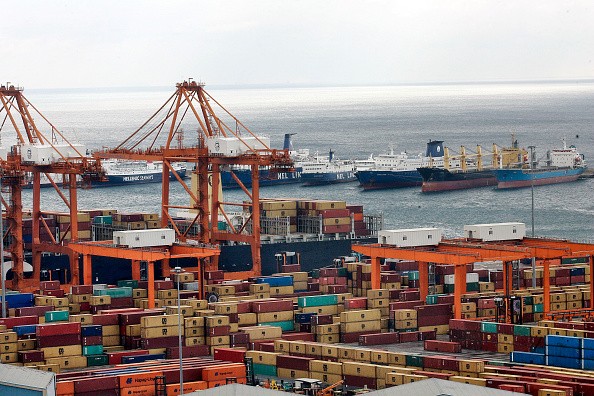Chinese shipping firm Cosco is set to consolidate its hold over the key Greek port of Piraeus Wednesday after agreeing to pay 368.5 million euros in exchange for a 67-percent stake in the country’s biggest harbor.
Cosco will pay 22 euros per share for the stake in Piraeus, according to a China Daily report citing the Athens-based Republic Asset Development Fund.
The company was previously asked to submit a better offer last week after it emerged as the sole bidder for the stake, an outcome that Greek officials called "disappointing," the report said.
The offer accepted is a 70-percent premium to the closing share price of Piraeus harbor of 12.95 euros Wednesday and a valuation of the entire business at 550 million euros.
According to the Hellenic Republic Asset Development Fund (HRADF), the entire value of the Cosco agreement would amount to approximately 1.5 billion euros, inclusive of the purchase price, investments, dividends and income from the concession agreement.
The result provides much-needed breathing space for Greek Prime Minister Alexis Tsipras, who is currently battling domestic opposition to state asset sales and for pushing for pension reform. In the past week, government officials vowed to do their utmost to ensure Greece will get the best possible price for a majority stake in Piraeus, a port key to China's plans for a modern commercial empire supplying goods across Europe.
The Hong Kong-listed Cosco was the sole confirmed bidder for the 67-percent stake in Piraeus, where the company already runs container operations at two piers. Its short-listed competitors, Danish-owned APM Terminals and Philippine-based operator International Container Terminal Services Inc., failed to put in a binding bid and dropped out at the last minute in the long-delayed sale.
Cosco's investment in Piraeus is seen by analysts as a key part of China's One Belt, One Road policy, which envisions a modern land and maritime equivalent of the Silk Road. Since the Chinese shipping firm started container operations in 2009, traffic has increased at the harbor, making Piraeus one of the fastest growing ports in the world. Chinese Premier Li Keqiang also described Piraeus as China's gateway to Europe during his official state visit to Greece last year.
HRADF said Cosco agreed to mandatory investments of 350 million euros over the next decade and the income accruing to the Greek state from the concession agreement of approximately 410 million euros. The amount includes the expected revenue from dividends and additional investments up until the concession agreement ends in 2052.
Of the mandatory investments, 300 million euros will be spent in the first five years, most of which will go to ship repairing operations. Officials expect Cosco to spend another 270 million euros in investments up to 2052, from the original bid of 17.5 euros a share for the stake.
The transaction will be in two stages: Cosco will acquire a 51-percent stake in Piraeus for 280.5 million euros and will acquire the additional stake in the next five years for 88 million euros on completion of the terms in the shareholder agreement, including investments.
Greece will initially keep a 23-percent stake in the company, with that dropping to 7 percent on conclusion of the two-step process.
Cosco's victory at Piraeus is seen as a start of further Chinese investment in Greece, where unemployment is at an all-time high and foreign investment has dried up amid six years of political unrest and fears of a financial collapse. On Wednesday, Prime Minister Li called Tsipras to "underline China's keen interest in bolstering ties with Greece," according to the state-owned Xinhua News Agency.
Greek officials expect Chinese investment in projects such as a major freight and logistics center on the outskirts of Athens and a new airport on the island of Crete.
The Piraeus sale will be the first state asset sale the leftist Tsipras government can claim after being voted into power a year ago, with promises to halt privatizations and nullify the two bailout agreements that led to higher taxes and cuts in pensions and wages among Greeks. The president has since tempered his tone since being forced in July to accept a new 86 billion euro bailout to retain Greece within the eurozone.
In December, the government wound up previously agreed deals to privatize 14 regional airports and the sale of a seaside resort in the Greek capital, but these deals have been shelved after Tsipras came to power in 2015.
Cosco has seen five separate Greek premiers, not including caretakers, after it gained the license to operate Pier II in 2008 for 30 years at the cost of 490 million euros. The deal has since become a major campaign issue as Greek politicians curry votes from union workers, such as those in the Piraeus piers, who are unhappy with the austerity measures.



























